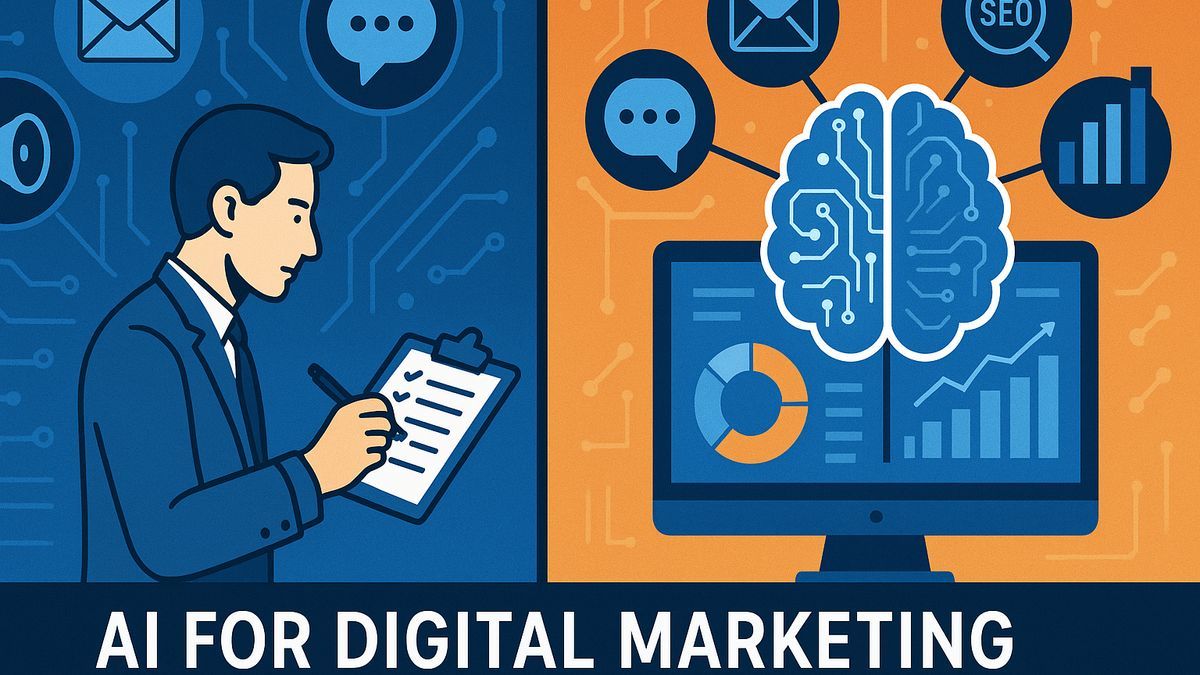Using AI for Digital Marketing: What to Know? Digital marketing has evolved rapidly over the past decade, but perhaps no advancement has been as transformative as artificial intelligence. From automated customer service to predictive analytics, AI is reshaping how businesses connect with their audiences and optimise their marketing efforts. state of artificial intelligence in youre
AI for Digital Marketing
AI for Digital Marketing: AI-powered digital marketing uses machine learning algorithms, natural language processing, and data analytics to automate, optimise, and personalise marketing campaigns. Instead of relying solely on human intuition and manual processes, businesses can now leverage AI to make data-driven decisions in real-time. intelligence in youre all set
Key AI Applications in Digital Marketing
Customer Segmentation and Targeting: AI analyses vast amounts of customer data to identify patterns and create detailed audience segments. This enables more precise targeting and personalised messaging that resonates with specific customer groups.
Content Creation and Optimisation: Modern AI tools can generate blog posts, social media content, and ad copy. While human oversight remains essential, AI can significantly speed up content production and suggest optimisations based on performance data.
Predictive Analytics: AI algorithms analyse historical data to predict future customer behaviour, campaign performance, and market trends. This helps businesses allocate budgets more effectively and anticipate customer needs.
Chatbots and Customer Service: AI-powered chatbots provide 24/7 customer support, answer frequently asked questions, and qualify leads. Advanced chatbots can handle complex conversations and seamlessly transfer difficult queries to human agents.
Email Marketing Automation: AI optimises email campaigns by determining the best send times, subject lines, and content for each recipient. It can also automatically segment email lists and trigger personalised email sequences based on user behaviour.
Benefits of AI in Digital Marketing
Increased Efficiency: AI automates repetitive tasks, allowing marketing teams to focus on strategy and creative work.
Better ROI: Data-driven decisions and automated optimisations typically lead to improved campaign performance and higher returns on marketing investment.
Personalisation at Scale: AI enables businesses to deliver personalised experiences to thousands of customers simultaneously.
Real-Time Optimisation: AI systems can adjust campaigns in real-time based on performance data, maximising results.
Enhanced Customer Insights: AI uncovers patterns in customer data that humans might miss, providing a deeper understanding of audience behaviour.
Implementation Challenges to Consider
Data Quality and Privacy: AI systems require high-quality data to function effectively. Businesses must ensure their data collection practices comply with privacy regulations and maintain data accuracy.
Initial Investment Costs: Implementing AI marketing tools often requires significant upfront investment in software, training, and potentially new personnel.
Learning Curve: Teams need training to effectively use AI tools and interpret their outputs. The technology evolves rapidly, requiring ongoing education.
Over-Automation Risk: While automation increases efficiency, maintaining human oversight ensures campaigns remain authentic and aligned with brand values.
Practical Steps for Getting Started
1. Assess Your Current Marketing Stack: Evaluate your existing tools and identify areas where AI could provide the most immediate value.
2. Start Small: Begin with one or two AI applications rather than attempting a complete overhaul. Email automation or chatbots are often good starting points.
3. Invest in Data Infrastructure: Ensure you have systems in place to collect, store, and analyse customer data effectively.
4. Train Your Team: Provide training on AI tools and help your team understand how to work alongside artificial intelligence.
5. Monitor and Optimise: Regularly review AI-driven campaign performance and adjust strategies based on results.
Considerations for UAE Businesses
AI for Digital Marketing: The Middle East market presents unique opportunities and challenges for AI-powered marketing. Cultural sensitivity remains crucial when implementing AI-generated content, and businesses should ensure their AI systems understand local preferences and regulations.
Regional data residency requirements may also impact how businesses implement AI marketing tools, particularly for companies handling sensitive customer information.
Popular AI Marketing Tools
Content Creation: ChatGPT, Jasper, Copy.ai Analytics: Google Analytics Intelligence, Adobe Analytics Email Marketing: Mailchimp, HubSpot, Klaviyo Social Media: Hootsuite Insights, Sprout Social Customer Service: Intercom, Drift, Zendesk
The Future of AI for Digital Marketing
As AI for Digital Marketing technology continues advancing, we can expect even more sophisticated applications. Voice marketing, advanced personalisation, and predictive customer lifetime value modelling will become standard practices.
However, the most successful businesses will be those that use AI for Digital Marketing to enhance human creativity and decision-making rather than replace it entirely.
Getting Professional Help
Implementing AI for Digital Marketing requires careful planning and technical expertise. Working with experienced IT consultants can help businesses navigate the complexities of AI adoption while avoiding common pitfalls.
The key is finding the right balance between automation and human insight, ensuring that AI enhances your marketing efforts without compromising your brand’s authentic voice.

